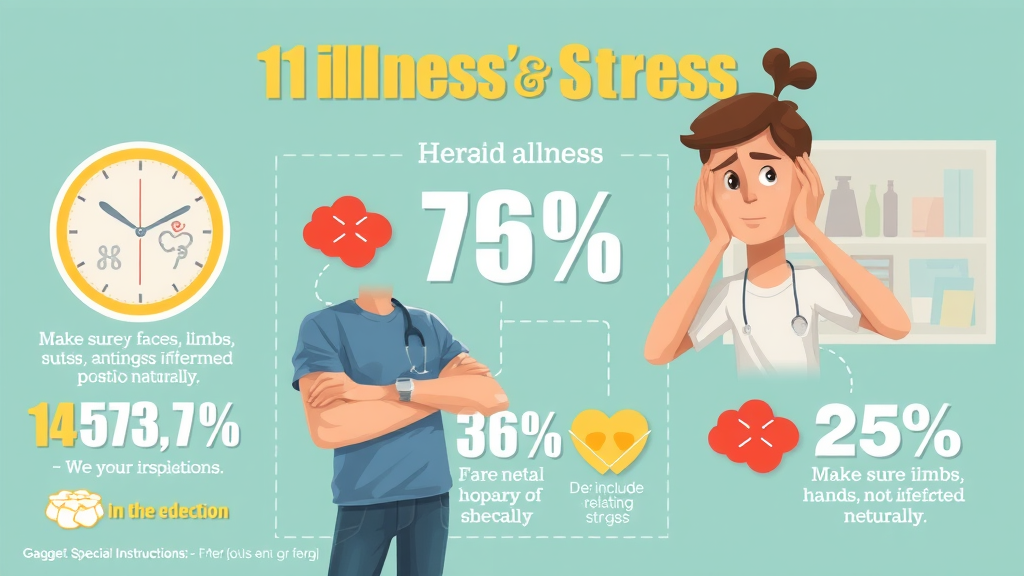Did you know that over 75% of adults in the United States experience physical symptoms due to stress, with significant contributors being chronic illnesses? This unnerving statistic highlights the pivotal role of illness as a behavioral stressor, demanding our attention and action. Recognizing illness as a stressor is crucial in understanding how to navigate the complex interplay between health and stress, ultimately empowering us to build effective resilience strategies.
The Understated Impact of Illness as a Behavioral Stressor
When we talk about behavioral stressors, illness often flies under the radar despite its significant impact. Chronic illnesses, in particular, place an immense burden on the body's physical and mental state, disrupting daily routines and escalating stress levels. This disruption occurs as the body reacts to illness by continuously entering the stress response state, which impacts heart rate, blood pressure, and overall nervous system functioning.
Moreover, the persistent nature of chronic conditions can lead to disease progression due to prolonged exposure to stress. This wear-and-tear effect on the body's biological stressors, including the immune system, often results in heightened vulnerability to further health complications. As both a biological and behavioral stressor, illness intricately connects to emotional distress, creating a vicious cycle of stress and illness.
Startling Statistics on Illness and Stress

A study conducted by the American Psychological Association found that chronic stress from health conditions affects over 43% of adults, showcasing the importance of addressing the stress response mechanisms. Interestingly, individuals with chronic illnesses report more stress symptoms than their healthier counterparts, reflecting the dire need for effective stress management techniques.
Understanding Behavioral Stressors
The term "behavioral stressors" refers to factors that disrupt our usual behavior, including illness, financial pressures, and lifestyle choices. The consumption of alcohol, for instance, is a short-term stress reliever that can lead to disease if managed poorly. On the other hand, behavioral stressors like chronic illness have profound implications on an individual's ability to cope with life's demands, often leading to deteriorated mental health.
How Illness Triggers Behavioral Stress
Illness affects more than just physical health; it serves as a trigger for behavioral stress by altering emotional and mental states. When an individual is diagnosed with a chronic illness, they encounter a new set of challenges that can alter one's mood, behavior, and stress levels. This persistent stressor, if left unchecked, can severely affect mental health, resulting in anxiety, depression, and other psychological issues.
Insight into the Stress Response Mechanism

The human nervous system is programmed to initiate a stress response when faced with threats, including illness. This involves the release of hormones and the body working harder to defend against perceived attacks. However, chronic illnesses cause the body to remain in a constant state of high alert, leading to long-term stress that exhausts the body's reserves and, steadily over time, contributes to chronic stress conditions.
Role of Mental Health in Coping with Stress
Mental health is a crucial component in managing the stress linked to illness. By implementing effective stress management techniques such as mindfulness, cognitive behavioral therapy, and regular physical activity, individuals can enhance mental health and develop resilience against stressors. Ensuring robust emotional and psychological well-being is vital for reducing the harmful impact of stress response reactions associated with illness.
Building Resilience Amidst Chronic Stress
Building resilience helps individuals thrive despite the challenges posed by chronic stress. The growing awareness about illness as a behavioral stressor underlines the need for proactive measures to develop emotional, mental, and physical fortitude.
Importance of a Robust Immune System

A healthy immune system is crucial in combating the physical attacks precipitated by illnesses and the stress responses that ensue. The body's capacity to adapt to stress is directly linked to the immune system's strength, which requires adequate nutrition, regular exercise, and sufficient sleep. Emphasizing a lifestyle that supports immune functionality aids in mitigating the adverse effects of chronic stress and illness.
Techniques to Enhance Mental Health
Adopting mental health enhancement strategies is key to building resilience. Techniques such as mindful meditation, journaling, and engaging in therapy provide a robust foundation for mental fortitude. These practices help individuals reframe challenging situations, decrease stress symptoms, and foster a healthier response mechanism to stressors, leading to improved life quality.
Notable Quotes on Stress and Resilience
"Resilience is not about overcoming, but becoming resilient enough to embrace stress."
Analyzing Acute vs. Chronic Stress
Acute and chronic stress manifest differently in terms of duration and impact on the body. Understanding these variations can aid in effective stress intervention.
| Feature | Acute Stress | Chronic Stress |
|---|---|---|
| Duration | Short-term, temporary | Long-term, ongoing |
| Trigger | Specific events | Persistent conditions |
| Impact | Temporary disruption | Can lead to severe health issues |
FAQs on Behavioral Stressors
What are Behavioral Stressors?
Behavioral stressors are aspects of life that disrupt normal behavior and contribute to stress. These include chronic illnesses, unhealthy lifestyle choices, and prolonged work pressures. Understanding behavioral stressors is essential for developing strategies to reduce their impact.
Understanding Common Stress Responses

The human body produces various stress responses to cope with demanding situations, such as increased heart rate, rapid breathing, and heightened alertness. Recognizing these symptoms can empower individuals to implement early intervention strategies.
Is it true that illness is considered a behavioral stressor?
Yes, chronic illness is often considered a behavioral stressor given its profound effects on an individual's emotional and mental well-being. The continuous demands of managing a health condition contribute significantly to stress and its related symptoms.
Is illness considered a behavioral stressor true or false brainly?
The statement is true—illness functions as a behavioral stressor by triggering stress responses, impacting both physical and mental health, and altering daily behaviors.
Practical Tips in Mitigating Stressful Impacts
- Engage in regular physical activity to boost mood and reduce stress symptoms.
- Practice mindfulness techniques, such as deep breathing or meditation, to calm the mind.
- Ensure sufficient sleep to enhance recovery and improve resilience to stress.
- Consume a balanced diet rich in nutrients that support a healthy immune and nervous system.
Conclusion
Faced with behavioral stressors like illness, building resilience requires a multifaceted approach focusing on physical health, mental well-being, and stress management. By understanding stressors' impact and adopting strategies to mitigate their effects, individuals can foster a life marked by resilience and health.
 Add Row
Add Row  Add Element
Add Element 



Write A Comment